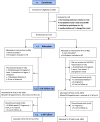Structured education programme for women with polycystic ovary syndrome: a randomised controlled trial
- PMID: 29133383
- PMCID: PMC5744630
- DOI: 10.1530/EC-17-0274
Structured education programme for women with polycystic ovary syndrome: a randomised controlled trial
Abstract
Objective: To evaluate the effectiveness of a structured education programmes in women with polycystic ovary syndrome (PCOS).
Methods: Single-centre, randomised controlled trial, testing a single exposure to a group-based, face-to-face, structured education programme. Inclusion criteria were women with PCOS, aged 18-49 years inclusive and body mass index ≥23 kg/m2 for black and minority ethnicities or ≥25 kg/m2 for white Europeans. Primary outcome was step-count/day at 12 months. Secondary outcomes included indices of physical activity, cardiovascular risk factors, quality of life (QoL) and illness perception (IP).
Results: 161 women were included (78 control, 83 intervention); 69% white; mean age 33.4 (s.d. 7.6) years, of whom 100 (48 intervention; 52 control) attended their 12-month visit (38% attrition). 77% of the intervention arm attended the education programme. No significant change in step-count was observed at 12 months (mean difference: +351 steps/day (95% confidence interval -481, +1183); P = 0.40). No differences were found in biochemical or anthropometric outcomes. The education programme improved participants' IP in 2 dimensions: understanding their PCOS (P < 0.001) and sense of control (P < 0.01) and improved QoL in 3 dimensions: emotions (P < 0.05), fertility (P < 0.05), weight (P < 0.01) and general mental well-being (P < 0.01).
Discussion: A single exposure to structured education programme did not increase physical activity or improve biochemical markers in overweight and obese women with PCOS. However, providing a structured education in parallel to routine medical treatment can be beneficial for participants' understanding of their condition, reducing their anxiety and improving their QoL.
Keywords: attrition rate; illness perception; physical activity; polycystic ovary syndrome; quality of life; structured education.
© 2018 The authors.
Figures


References
-
- Fauser BC, Tarlatzis BC, Rebar RW, Legro RS, Balen AH, Lobo R, Carmina E, Chang J, Yildiz BO, Laven JS, et al. Consensus on women’s health aspects of polycystic ovary syndrome (PCOS): the Amsterdam ESHRE/ASRM-Sponsored 3rd PCOS Consensus Workshop Group. Fertility and Sterility 2012. 97 28.e25–38.e25. (10.1016/j.fertnstert.2011.09.024) - DOI - PubMed
LinkOut - more resources
Full Text Sources
Other Literature Sources

